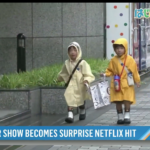






Yes, Young Kids are “Old Enough” to Run Errands
The new Netflix series “Old Enough” shows kids ages 5, 4, 3 and even two running errands without an adult. That’s why The Today Show is calling me. “Won’t this give parents the wrong idea?” asks the booker, who’d like me to come on to discuss this issue.
The only thing that gives parents the wrong idea is asking the question, “Won’t this give parents the wrong idea?” That’s because in America, any time that parents might somehow get even the merest notion that kids can do anything safely or successfully on their own, the media is determined to make this sound controversial (if not crazy).
“What if he never came home?”
I speak from experience. Fourteen years ago, I wrote a column for The New York Sun, “Why I Let My 9-Year-Old Ride the Subway Alone.” In the media firestorm that greeted my piece, a few interviewers wondered how my son liked his adventure, or where he was going next. But eventually most of them went in for the kill: “It sounds like he had fun. But how would you have felt if he never came home?”
In other words, they took an upbeat story of a kid doing something on his own – a milestone – and did the best they could to turn it into a sad and cautionary tale.
I realize New York just experienced a subway tragedy – a tragedy so rare it is making headlines around the world — but in a way that is my point: Rare tragedies DO happen. Kids fall down stairs. Kids choke on food. The most common way kids die, if you’re wondering, is as car passengers. We don’t stop them from walking, eating solid food, or being driven to the dentist, because we are able to keep the odds in perspective.
But somehow we can no longer keep our fears in check when it comes to letting them do anything on their own.
And the Japanese can.
What the Japanese let their kids do
So in “Old Enough,” a series so popular it has been running for 30 years as “My First Errand” in Japan, we see a boy of not quite three go to the grocery for his mom. We see a very little girl walk through town to bring her dad, a soba chef, his apron. A boy of two goes to the dry-cleaner near home to pick up his dad’s sushi uniform. (The show could also be a food travelogue – everyone is always cooking, eating or buying delicious-looking food.) One 4-year-old goes to a giant seafood marketplace and wanders among the stands, finding the fish her mom wants. (It looks delicious, too.)
There has been some carping – as it were – about how “real” this reality show is, considering a camera crew is always near the kids, sometimes hidden, sometimes obvious even to the viewer. But even if the parents know their child will have this escort, the kids really do have to cross streets, talk to shop keepers, and find their way.
Kids desperately want to help out
And by doing so, you can almost see them growing a little taller. These are not precious pets, they are young humans, desperate to take their place in the world. The desire to be a little helper peaks in kids at age 3 or 4, says anthropologist David Lancy. If that desire is not fulfilled – if the kids are never trusted to do anything “real” – that desire disappears, he says. The technical word for this is “extinction.”
In America, where kids are suffering ever-climbing rates of anxiety and depression, it’s hard not to wonder whether extinguishing a generation’s desire to be helpful and brave is really making them “safer.” They’re not safer from feeling useless. They’re not safer from feeling like babies.
If “Old Enough” reminds America of just how competent kids can be when we let them, even as it pushes the media to pivot from, “They could get hurt!” to, “They sure are plucky!”, we just may see kids out and about on their own. Competent. Confident. Ready for the next challenge.
But probably not bringing home anything quite as yummy as the kids do in Japan.
If you’d like to get your kids started doing their first errands, download The Let Grow Independence Kit — or have your school assign the Let Grow Project, where kids get the homework assignment, “Do something new, on your own.”



Comments are closed for this article.